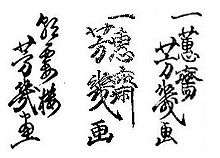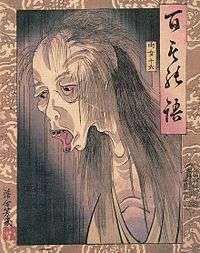Utagawa Yoshiiku
Utagawa Yoshiiku (歌川 芳幾, 1833 – 6 February 1904), also known as or Ochiai Yoshiiku (落合 芳幾), was a Japanese artist of the Utagawa school.[1]

Life and career
Born the son of teahouse proprietor Asakusa Tamichi in 1833, Yoshiiku became a student of ukiyo-e artist Utagawa Kuniyoshi toward the end of the 1840s. His earliest known work dates to 1852 when he provided the backgrounds to some actor prints by his master.[2]
Yoshiiku's earliest works were portraits of actors, beauties, and warriors. He later followed Kuniyoshi into making satirical and humorous pieces, and became the leading name in the field after Kuniyosh's death in 1861. He illustrated the Tokyo Nichi Nichi Shimbun ("Tokyo Daily News") from 1874 to 1876, and then co-founded the Tokyo E-iri Shinbun ("Tokyo Illustrated News"). The latter folded in 1889, and Yoshiiku returned to making prints. He struggled during his last years, and his last known print appeared in 1903. His three known students, Ikumura, Ikuei, and Ikumasa, failed to achieve recognition.[2]
Yoshiiku had ten children with his second wife, only one of whom survived childhood. Yoshiiku died at age 71 in a temporary residence on 6 February 1904 in Honjo. He was buried at Anseiji temple in Asakusa and given the posthumous Buddhist name Juzen'in Hōkinikkaku Koji.[2]
Prints
Yoshiiku's works include the print Kokkei Wanisshi-ki (滑稽倭日史記, "Comical Record of Japanese History"), which employs the traditional theme of Hyakki Yagyō on contemporary Japanese military actions in China. He cooperated with Tsukioka Yoshitoshi in the production of the muzan-e ("cruel pictures") series Eimei nijūhasshūku ("Twenty-eight famous murders with verse").[3]
Gallery
 Sino-Japanese War, Butterfly and Praying Mantis, 1895
Sino-Japanese War, Butterfly and Praying Mantis, 1895 A female rain spirit (Hyakumonogatari Ameonna), 1890
A female rain spirit (Hyakumonogatari Ameonna), 1890_-_Utagawa_Yoshiiku.jpg) Portraits as True Likeness in the Moonlight (Makoto no Tsukihana no Sugata-e), c. 1845-1865. Woodblock print, 35.1 × 23 cm (13.82 × 9.06 in)
Portraits as True Likeness in the Moonlight (Makoto no Tsukihana no Sugata-e), c. 1845-1865. Woodblock print, 35.1 × 23 cm (13.82 × 9.06 in)
References
- Lane, Richard. (1978). Images from the Floating World, The Japanese Print, p. 355.
- Marks 2012, p. 158.
- Forbes, Andrew ; Henley, David (2012). 28 Famous Murders. Chiang Mai: Cognoscenti Books. ASIN: B00AGHJVOS
Works cited
- Marks, Andreas (2012). Japanese Woodblock Prints: Artists, Publishers and Masterworks: 1680–1900. Tuttle Publishing. ISBN 978-1-4629-0599-7.CS1 maint: ref=harv (link)
References
- Lane, Richard. (1978). Images from the Floating World, The Japanese Print. Oxford: Oxford University Press. ISBN 9780192114471; OCLC 5246796
- Newland, Amy Reigle. (2005). Hotei Encyclopedia of Japanese Woodblock Prints. Amsterdam: Hotei. ISBN 9789074822657; OCLC 61666175
- Roberts, Laurance P. (1976). A Dictionary of Japanese Artists. New York: Weatherhill. ISBN 9780834801134; OCLC 2005932
External links
| Wikimedia Commons has media related to Utagawa Yoshiiku. |
- Museum of Fine Arts, Boston: digitized images
- Indianapolis Museum of Art: digitized image
- Brooklyn Museum: digitized images
- Los Angeles County Museum of Art: digitized images